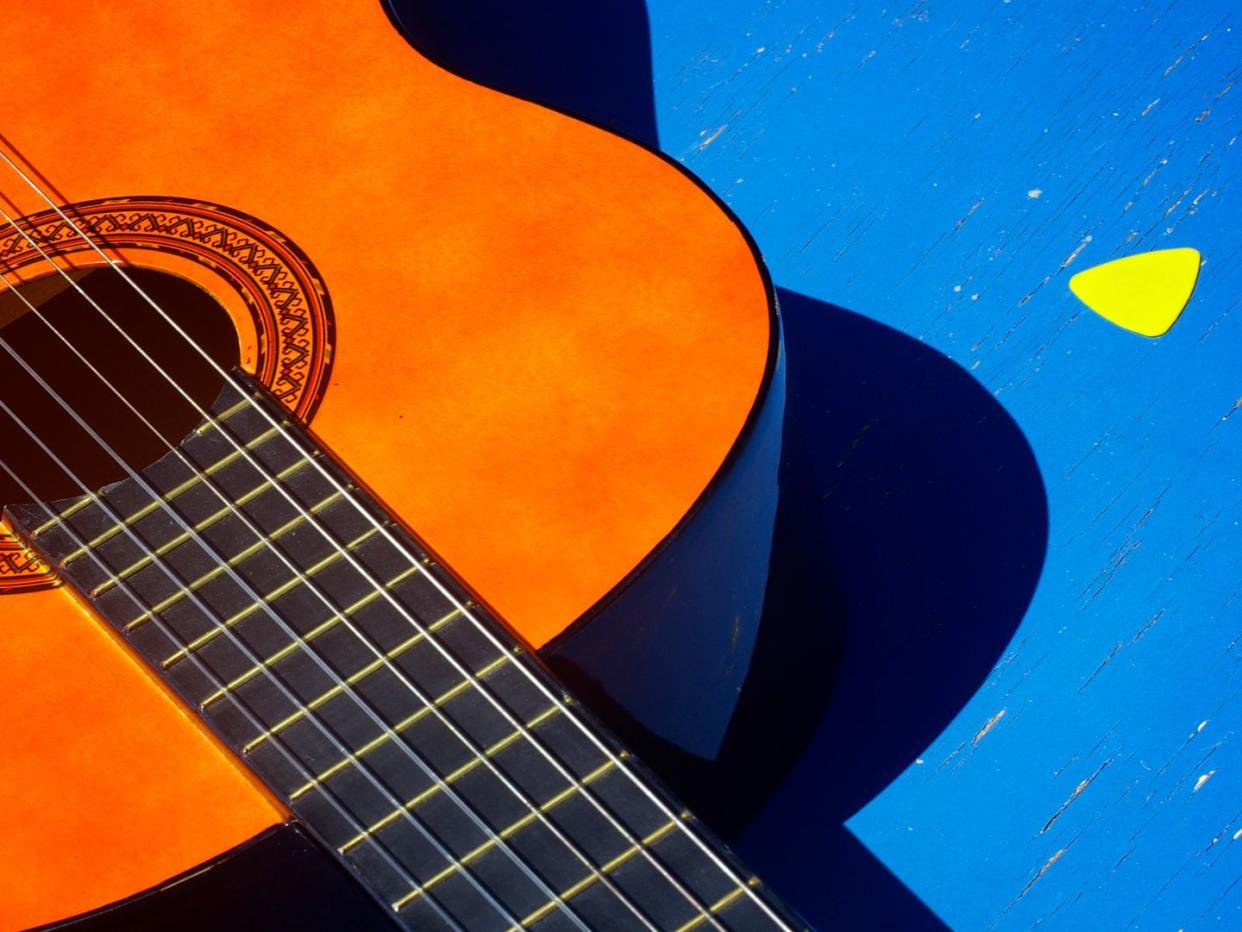A Hobby Is The Exact Escape You Need Right Now. Here’s How To Get Started.

My guitar’s been collecting dust since 2014. There was a time when the black electric-acoustic Fender was my best friend: I bought it at 16 and wrote songs to help me process the pains of adolescence. I loved getting lost in lyrics and strumming away the outside world until I emerged with my feelings neatly packaged in a catchy tune. Music was a major part of my life: I wrote musicals. I took voice lessons. I penned a song a week. Then…I stopped.
I’m too busy, I thought, as adult responsibilities piled up. I couldn’t justify spending time on anything that wasn’t “productive.” If it didn’t contribute to my career as a journalist, what was the point? Then, along with the rest of the world, my go-go-go lifestyle came to a standstill as social distancing became the new normal and I found myself working and socializing from home. Suddenly, all the time I wish I had was available (thank you, novel coronavirus). And my guitar was calling out my name.
Why did I wait until being in quarantine? Well, workweek hours are at an all-time high: The average increased about 8 percent between 1995 and 2018, per the U.S. Bureau of Labor Statistics. And in an age of influencers and side gigs, it seems every interest needs to turn into a book, an Etsy shop, a podcast, or a video series. It’s no wonder millennials have been dubbed the “burnout generation,” with hobbies thrown into the flames.
“There’s a cultural fixation on hustling,” says Terri Bacow, PhD, a psychologist in New York. “People, especially women, don’t give themselves ‘permission’ to play, because our culture forbids it.” But playing—which, for the record, means having no other goal besides doing something you enjoy—is good for your mental health. “Outside interests help you form a multilayered sense of identity,” Bacow says, meaning you’re not just a teacher, or a mom, or a boss; you’re a complex person with many interests and skills.
As I found myself with more quality solo time, I started letting go of that pressure and re-thinking of a hobby as an outlet for all of the many emotions I've been going through. I feel more calm the instant I strum and science backs me up: Hobbies actually reduce stress and lower your heart rate, a study in the Annals of Behavioral Medicine shows. Sounds obvious, but it’s kinda nice to have a science-backed excuse to make time for yourself, right?
Will I quit my job and sign up for The Voice? No! But I’m allowed to have a hobby, and you are too. Now is the time. Here's how to get yours off the ground:
Start super-duper small.
You might not have time to paint a picture of your entire squad (as if they’d sit still), but you could stash a sketchbook in your bag and doodle here and there when you’d normally break out your phone. “We waste a lot of time on social media,” says Jaime Kurtz, PhD, an associate professor of psychology at James Madison University. Thankfully, iPhones have a Screen Time tool under Settings that tells you which apps suck the most time. Fill those minutes with a mini version of your hobby instead.
Schedule your activity.
Bacow tells her patients to block out time on their calendars for the things they love. “Once people allow themselves to do something fun, they see the benefits and become motivated to make time for their interests,” she says. The more you get that boost in mood and self-esteem from your hobby, the more positive reinforcement you feel (sorta like working out!). Treat it as an appointment you can’t cancel.
Separate your hobby from work.
Pick an activity that taps skills you don’t use on the job to form an identity beyond your career bubble, Kurtz says. Ignoring outside passions can make you more prone to depression and anxiety, she says, because seeing yourself as other things—a baker, a painter—protects you when your boss tells you to step it up. New pastimes also force you to engage new regions of your noggin, making you sharper, more focused, and alert, which is “crucial to sustaining brain health,” says Michael Merzenich, PhD, a pioneer in brain plasticity research.
Know that working out counts.
It all comes down to whether you enjoy the form of exercise. Slogging through a Spin class because you think you “need” to, or because you’re punishing yourself for something you ate? Not a hobby (or a particularly healthy mindset, for that matter). But body-rolling through a weekly cardio dance class you look forward to totally counts. “It’s about framing the workout as a choice as opposed to a to-do that you need to check off for the day,” says Kurtz.
Pick the perfect challenge.
The ideal hobby puts you in the zone—also known as a flow state, or “when you lose yourself in something,” says Kurtz. To get there, you should experience some degree of challenge (Net-flix bingeing isn’t a great hobby, sorry), but it shouldn’t be so hard you want to give up. For me, the joy of strumming my guitar and learning new songs was such a welcome release that during one session, three hours had passed before I even noticed! For you, it might be a pottery sesh, a soccer game, or even a run in which you forget what mile you’re on. That’s flow.
This article appears in the May 2020 issue of Women’s Health, available April 21. Subscribe now for just $5.
You Might Also Like